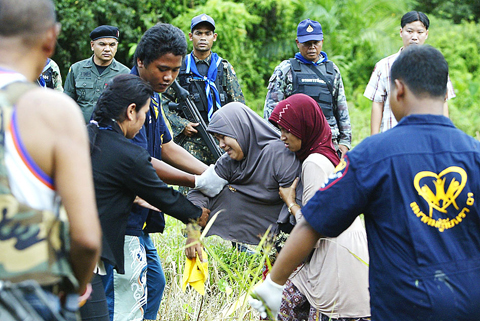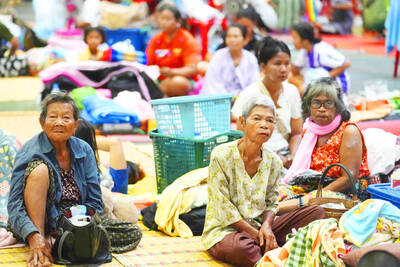In a tree-shaded prison yard in Thailand’s south, inmates cuddle their children and chat to their wives over plates of halal food, while guards with batons circle the rare gathering.
For most of these detainees awaiting justice on charges relating to the five-year insurgency in the Muslim-majority region, it is the first time in months that they have had physical contact with their families.
Mahpaozi Rusah, 34, clings solemnly to his four-year-old son as the time comes for his loved ones to leave Narathiwat jail, while his wife wipes away tears with her hijab as they say their goodbyes.

PHOTO: AFP
“He is really missing his sons,” said the prisoner’s mother, Peena Mama, who said he was arrested by authorities in March at his village home some 100km away, for reasons that remain unclear.
“He would be so happy if he was released soon but he has no clue when it will be,” she said.
There are 202 people detained here on security charges and some may face 18 months or more waiting for their trials to start, according to statistics from Thailand’s Cross Cultural Foundation, a rights group.
It said a total of 548 such suspects are now imprisoned in the troubled provinces of Narathiwat, Yala, Pattani and parts of Songkhla, with sometimes devastating effects on their often large families.
The southern region made up an autonomous Malay Muslim sultanate until it was annexed by mainly Buddhist Thailand in 1902, and tensions have simmered ever since.
More than 3,700 people have been killed since the current uprising began in January 2004 and security forces have arrested thousands of Muslims.
“We want to help the detainees and their families to meet each other,” said Patimoh Maneng of the Muslim Attorney Center, which provides free legal aid and organized the prison activity with the foundation and other groups.
Although relatives are allowed to visit the jail regularly, normally they must communicate with the prisoners through iron bars and many struggle to afford the cost of travel.
“The authorities give them no help,” Patimoh said. “People suffer too much and some families have to collect money for one month just for one visit because they are poor.”
Mother-of-two Shifah Stawfah came to visit her husband who was arrested in February with 12 others. Like other visitors, she brought her husband plastic bags packed with treats such as fresh fruit.
“Of course he feels angry ... He wants to come out and live like normal people,” she said in Yawi, the main dialect spoken in the region.
“I don’t know when the trial will be. We never get any information from the authorities,” he said.
The detainees often struggle to get legal assistance and it is “virtually impossible” for them to secure bail, according to Pornpen Khongkachonkiet of the Cross Cultural Foundation.
“We believe it’s a kind of preventative detention,” she said.
An Amnesty International report earlier this year said that security forces in the south were systematically using torture in their fight against the uprising, leaving at least four detainees dead.
Alleged survivors said the most common techniques included having plastic bags placed over their heads until they nearly suffocated and being kicked or stomped on.
Pornpen said reported torture cases mostly took place in the arrest period — during police interrogations and army custody — rather than in the prisons.
But she added that the court system in the south was failing to provide efficient justice.
For the families who have lost their main breadwinner, it has become a daily strain to make ends meet.
“Of course I have to work harder than before. Before we worked at the rubber plantation together but now I have to do it alone,” said Koreeyah Sama-ae, who brought her two children to visit her husband, arrested almost two years ago.
“The children suffer; their lives are difficult without their dad. I was crying when we said goodbye,” the 30-year-old said.

FOREST SITE: A rescue helicopter spotted the burning fuselage of the plane in a forested area, with rescue personnel saying they saw no evidence of survivors A passenger plane carrying nearly 50 people crashed yesterday in a remote spot in Russia’s far eastern region of Amur, with no immediate signs of survivors, authorities said. The aircraft, a twin-propeller Antonov-24 operated by Angara Airlines, was headed to the town of Tynda from the city of Blagoveshchensk when it disappeared from radar at about 1pm. A rescue helicopter later spotted the burning fuselage of the plane on a forested mountain slope about 16km from Tynda. Videos published by Russian investigators showed what appeared to be columns of smoke billowing from the wreckage of the plane in a dense, forested area. Rescuers in

‘ARBITRARY’ CASE: Former DR Congo president Joseph Kabila has maintained his innocence and called the country’s courts an instrument of oppression Former Democratic Republic of the Congo (DR Congo) president Joseph Kabila went on trial in absentia on Friday on charges including treason over alleged support for Rwanda-backed militants, an AFP reporter at the court said. Kabila, who has lived outside the DR Congo for two years, stands accused at a military court of plotting to overthrow the government of Congolese President Felix Tshisekedi — a charge that could yield a death sentence. He also faces charges including homicide, torture and rape linked to the anti-government force M23, the charge sheet said. Other charges include “taking part in an insurrection movement,” “crime against the

POINTING FINGERS: The two countries have accused each other of firing first, with Bangkok accusing Phnom Penh of targeting civilian infrastructure, including a hospital Thai acting Prime Minister Phumtham Wechayachai yesterday warned that cross-border clashes with Cambodia that have uprooted more than 130,000 people “could develop into war,” as the countries traded deadly strikes for a second day. A long-running border dispute erupted into intense fighting with jets, artillery, tanks and ground troops on Thursday, and the UN Security Council was set to hold an emergency meeting on the crisis yesterday. A steady thump of artillery strikes could be heard from the Cambodian side of the border, where the province of Oddar Meanchey reported that one civilian — a 70-year-old man — had been killed and

POLITICAL PATRIARCHS: Recent clashes between Thailand and Cambodia are driven by an escalating feud between rival political families, analysts say The dispute over Thailand and Cambodia’s contested border, which dates back more than a century to disagreements over colonial-era maps, has broken into conflict before. However, the most recent clashes, which erupted on Thursday, have been fueled by another factor: a bitter feud between two powerful political patriarchs. Cambodian Senate President and former prime minister Hun Sen, 72, and former Thai prime minister Thaksin Shinawatra, 76, were once such close friends that they reportedly called one another brothers. Hun Sen has, over the years, supported Thaksin’s family during their long-running power struggle with Thailand’s military. Thaksin and his sister Yingluck stayed